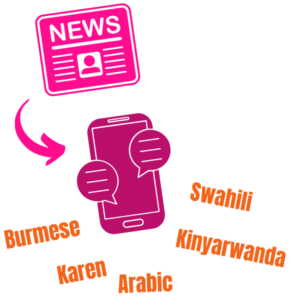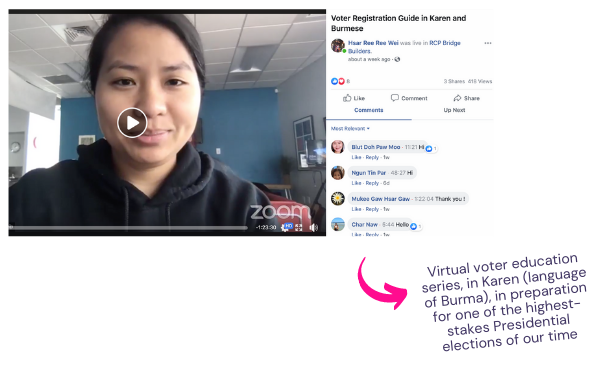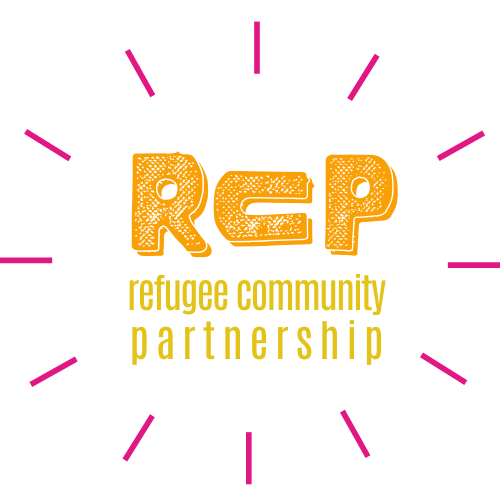RCP is a grassroots mutual aid network and resource hub made up of 2,000+ migrant and refugee Members and hundreds of volunteers rebuilding home together in central North Carolina.
Our Membership
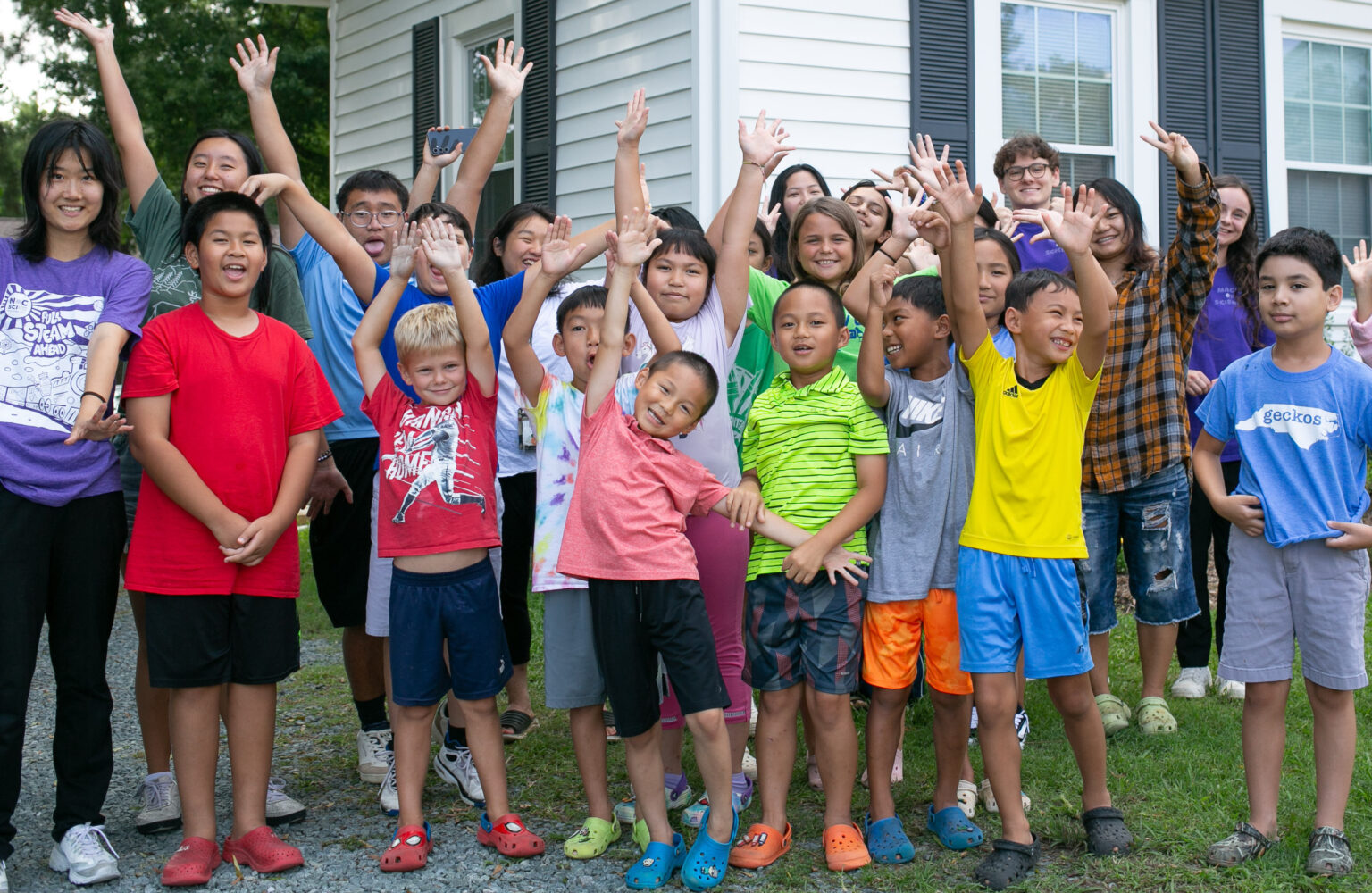
As of 2024, RCP has grown to 2,000+ Members rebuilding home in North Carolina:
- 46% hail from Burma, representing Burmese, Karen, Chin, and Rohingya ethnicities and languages;
- 28% speak Spanish, hailing from El Salvador, Colombia, Guatemala, Honduras and Mexico;
- 12% are from Afghanistan, speaking Pashto, Dari and Urdu;
- 6% speak Arabic, hailing from Syria, Yemen, Jordan, and Egypt;
- 4% are from the Congo, speaking Swahili, French and Kinyarwanda; and
- <1% are Sango-speakers from Central African Republic,
- <1% speak Purépecha, hailing from Michoacán, Mexico
- <1% speak K’iche’ Mayan and hail from Guatemala
- <1% speak Ukrainian and hail from Ukraine
- <1% speak Haitian Creole and French and and hail from Haiti
Here, neighbors are in deep relationship with one another. We use the language justice lens to see the ways that English dominance blocks access to community services, opportunities, and institutions, while gradually erasing global language cultures. We use institutional organizing principles to advance language access, working on the institution side to reveal language discrimination, make system-level changes, and rebuild the economy of language work so that refugee and migrant community members who wish to work with their communities as an interpreter have a sustainable career path to do so.
Community-Owned Language Access
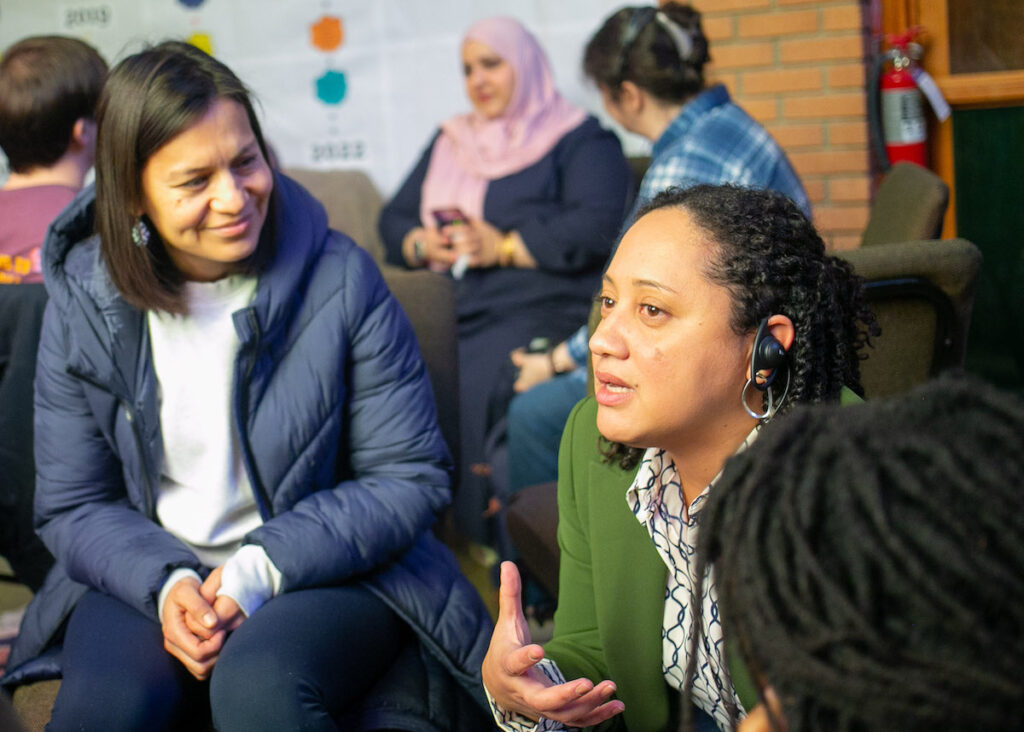
Relationship-based language support for any resident, any time, for any reason.
Our arterial focus on language justice emerged after RCP’s Women’s Group devoted one of their monthly gatherings to sharing frustrations and horror stories about the impact of language barriers in local medical clinics. It quickly became a community priority as it centered, also, around the conviction that cultural identities help keep us safe, nourished, and healthy – and language cultures quickly become endangered in English-dominant environments. We keep cultural identities alive through language preservation, language justice activism, and institutional organizing around language access practices and policies.
Community Coordinators
Our 5 Community Coordinators– hailing from Afghanistan, Honduras, Syria, Burma, and Malaysia –along with our bench of 30+ Community Interpreters provided linguistic and culturally-aligned support to Members as they navigate public schools, housing, health insurance, job applications, citizenship exams, and other critical aspects of public life.

Language Partners
Institutions are federally mandated to provide language services for residents who speak languages other than English, but few comply. Those that do typically provide telephonic language services, which often fail. Meanwhile, the economy for local language workers is drying up as language services are contracted out to multinational corporations using remote technologies. We want to change that.
Members reserve an RCP Language Navigator, a community interpreter to accompany them to any appointment where they, providing social and language support. The Language Navigator helps them navigate the environment, from parking lot to receptionist check-in, to appointment room, and advocates for an official interpreter from the service provider. If the clinic does provide an interpreter, the Navigator attunes to the quality of the interpretation provided, taking notes when misinterpretations occur, instances of verbal abuse, or all-out neglect (ex: when an interpreter refuses to communicate a patient’s question). The Navigator intervenes if the situation goes poorly, and ensures that the patient understands doctor’s instructions. They help with post-appointment activities, like filling prescriptions at the pharmacy or following up on referrals.
Meanwhile, we work on the institution-side to increase demand for quality language services, and on the community-side to increase the base of local language workers. We mobilize institutions to localize their language services by contracting with local interpreters, thereby harnessing the community’s existing multilingualism and strategically rerouting the dollars spent on multinational telephonic corporations back to the community.
Community-Owned Data Vault
RCP’s Community-Owned Data Vault is our tool to drive systems change locally and at the state level. One of the biggest barriers to improving language access in healthcare is the lack of accessible feedback mechanisms for migrant and refugee patients to report violations of their language access rights. So, RCP created a publicly maintained clearing house of feedback and evaluation data from refugee and migrant patients who receive accompaniment from our Language Navigators. This data is analyzed by our community research team to understand the true state of language exclusion and discrimination, to hold institutions accountable, and to further local language access advocacy efforts.
Relationship-based Community Organizing & Collective Care
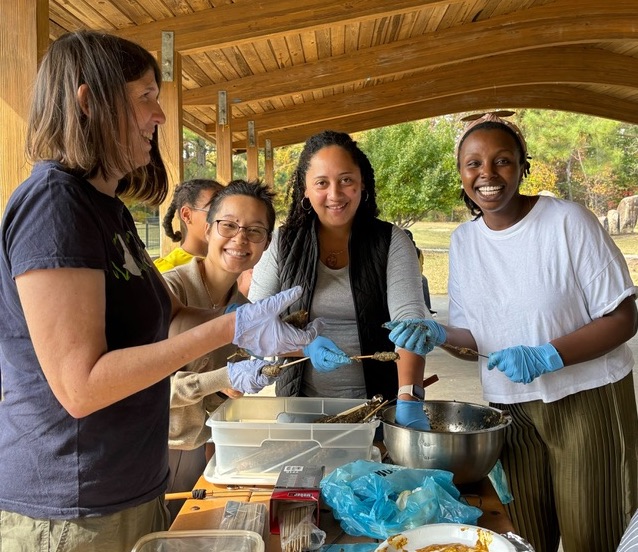
Bridge Builders
It’s all about relationships. Bridge Builders pairs RCP families with Bridge Builder Volunteers, emphasizing the unlearning of saviorism and the conventional “service” relationship in favor of relationships of reciprocity and mutual aid. We aim to eliminate the American Boot Straps Myth from our collective psyche, centering instead experiences of collective care and solidarity.
Bridge Builders is where neighbors take care of one another. Local residents are trained and matched with RCP families, walking alongside Members to assist them in addressing immediate needs – like finding housing or employment – and working toward long term goals, like going to college. Bridge Builders serve as cultural consultants and emergency contacts, accompanying Members to job interviews or medical appointments, and supporting them in times of crisis, like natural disasters or police encounters. These relationships are deliberately reciprocal, where both parties support one another, and are grounded in a critical awareness of structures and legacies of power and oppression, so that we may building an enduring foundation of radical companionship and solidarity.
Pre-COVID, 230+ residents worked with 520+ RCP Members per year. While Bridge Builders requires a 12-month minimum commitment, the relationships between Bridge Builders and Members last many more. Many Bridge Builders and Members have been working together since the initiative began in 2012.
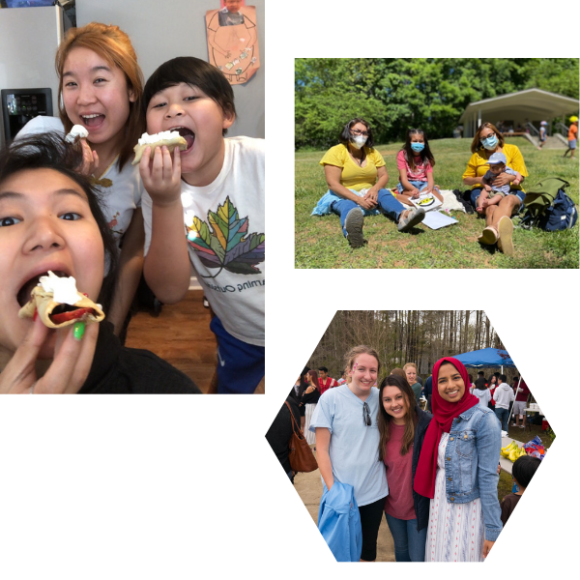
Democratizing the Commons
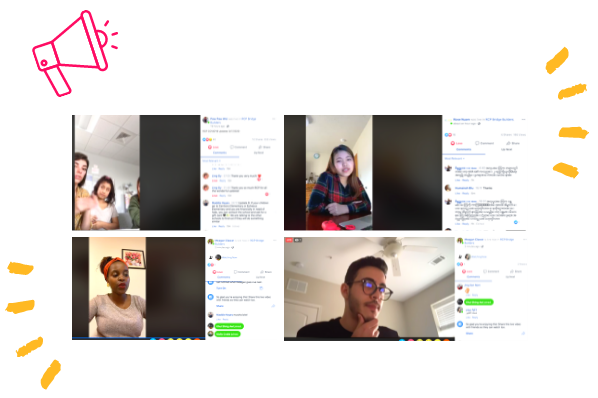
The Hive
Language inaccess is one of the greatest threats to the health and safety of refugee and migrant communities, blocking critical interactions with service providers, preventing the exchange of information, and obstructing participation in public life.
In 2024, our HIVE network of community WhatsApp groups has reached more than 1,500 migrant and refugee users with public information translated into 8 different languages. The Hive is our digital organizing environment – scaled up in 2020 for rapid response work – where RCP interpreters convert everything from emerging public health guidance to announcements of new community services to school closures to impending natural disasters into shareable media, sent directly to users in their primary language. The Hive is interactive, where users can reply to any message to receive one-on-one support from RCP staff and interpreters, right away. RCP interpreters host live Q&A sessions with Members – open to the public – to answer questions, in their primary languages, in real time.
The Hive began as an emergency response network during Hurricane Florence in 2018. RCP Members were mapped into a county-wide phone tree, and, partnering with the Town’s emergency communications department, RCP interpreters recorded mp4 audio and video messages in 5 different languages ’round the clock, getting critical disaster preparation information to 900+ non-English-speaking residents every few hours. Members reported that this was the first time they’d understood communications from local government and news sources.
